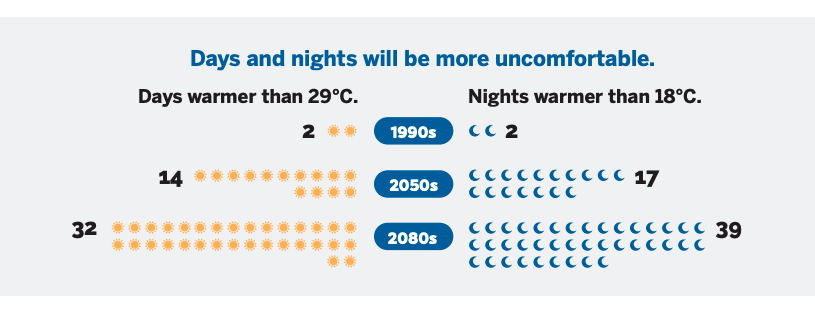Sea levels in Nova Scotia are expected to rise by as much as 1 meter by 2100 if greenhouse gas emissions are not “significantly” reduced, the province says, emphasizing the need to reduce planet-warming pollution.
in a new report In assessing climate risks in Nova Scotia, the province says that not only will sea levels rise if the province, and the world, continue to increase their emissions, but the region will experience a 4.8 degree Celsius increase in annual temperature. , an increase of 10 percent. in precipitation levels and higher wind speeds. The report, released Monday, notes recent storms: hurricanes fiona and Juan, have “hit harder than ever” and those trends will continue and worsen.
The report sets the stage for another anticipated document, the province’s climate plan, due to be released on Wednesday. Nova Scotia has previously committed to reducing greenhouse gas emissions to at least 53 percent below 2005 levels by 2030 and reaching net zero emissions by 2050.

There are some important risks recognized in Monday’s report, said Will Balser, coastal adaptation coordinator at the Center for Ecological Action in Halifax, while stressing the important next step of looking at how the province plans to address those risks.
“We have different scenarios, depending on how well we moderate our emissions and reduce our impacts as a planet and a province,” Balser said.
“But how that really fits together, we’ll know more on Wednesday and see how we’re going to hit those emissions targets and reduce our impacts and adapt to any changes that may come along.”
What people are reading

It was good to see that the province recognized that marginalized groups, such as the Mi’kmaq and low-income people, are at higher risk of experiencing climate impacts, Balser said. Recognizing how storms will increase the risk of flooding was also a positive step, they added. However, the report did not highlight the impact that climate change will have on communities in a way that includes mental health and the social implications and pain that climate disasters bring, they said.
Part of addressing climate impacts in a way that is inclusive of mental health is moving away from the typical cycle of a disaster hitting a community and then rebuilding in an area prone to flooding or other climate impacts. Balser said some especially vulnerable coastal areas should consider planned withdrawal, which is not happening in Nova Scotia so far. It also means strengthening mental and physical health systems and investing in affordable housing.
Balser will discuss Wednesday’s climate plan for details on how the province will adapt existing infrastructure to withstand climate change, careful planning of new building locations, improved disaster communication plans, and a focus on community resiliency. . The importance of all those points was further emphasized by Hurricane Fiona, they said.
Nova Scotia’s new report on climate risks lays the groundwork for another anticipated document, the province’s climate plan, due to be released on Wednesday. #NSpoli #ClimateChange
The report also breaks down the top climate concerns for the coming decades: flooding in the 2030s, wildfires in the 2050s, and high temperatures that will affect health and food production in the 2080s. Plus, it forecasts more rain. and less snow as winter temperatures rise.
It notes that “using oil, coal, and natural gas to heat homes, generate electricity, and power vehicles” contributes to climate change and will worsen climate impacts. Hereinafter, more than a half of electricity generation in Nova Scotia comes from coal.
In a statement from the province, Timothy Halman, the minister for the environment and climate change, said the report shows the area’s vulnerability and lays the groundwork for action. “Together, we have the opportunity to make positive change and work to protect each other and everything we hold dear,” Halman said.
Balser said the minister’s sentiment should go further.
“I look at it as if you were talking about an opportunity to make a positive profit. Rather, I see it more as an imperative to change, rather than just an opportunity,” she said.
“And in doing so, we need to be very clear about what we value most and what we are preparing to protect…so I think it is to re-prioritize the framework as we need to put people and the environment before corporate interests if we really want to deal with this in a holistic or decent way.”
